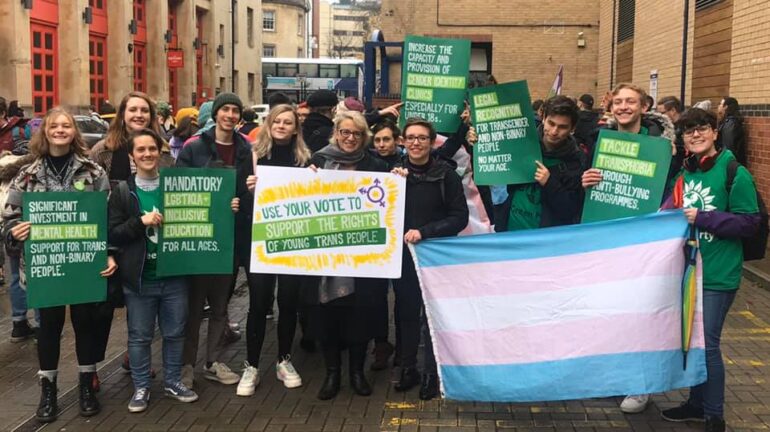Disentangling population reduction and women’s empowerment
By Fiona Ranford
There are growing murmurings amongst environmental activists that, despite the obvious unease around the subject, it’s time to tackle the population issue. These concerns have been exacerbated by the Malthusian rhetoric around last week’s 7-billionth-person.
Of course the weight of the eugenics and coercive population control weighs heavily on our minds. While explicitly racist approaches have and are still being voiced where poor black women are blamed for having large families, most recent environmentalist proponents have sought to take on more sophisticated approach. Making population a part of environmental policy has taken on a guise that appears smart and innocent, if not irresistible: women’s empowerment. It’s an elegant solution- women’s sexual rights are a good thing, tackling climate change is a good thing. Advocating one for the sake of the other is ethical efficiency- killing two birds with one stone.
The most obvious concern that comes to mind is the dubious focus of our political energies on population control as a solution to climate change. As others have argued recently (see Juliette Jowet and Duncan Green) it is at best a red herring, at worst a dangerous distraction from the causes of climate change: over-consumption of resources and devastating extraction of fossil fuels by a fraction of the world’s population. In my opinion there is nothing innocent about a shift to a focus on population, where political will to dismantle and restructure our unsustainable economy is so lacking that responsibility now lies with individual bodies.
But crucially, responsibility in this salvation-from-climatic-disaster scenario is outsourced not just to individuals but to women. Women’s rights as a means to population reduction signals an individualising and feminising of environmental responsibility under the comfortable guise of empowerment- enabling women to make choices. In this move lurks the same naivete that mistakes the insertion of women into the formal economy as the solution to poverty (the World Bank’s favourite solution). This approach denies the ways in which that same neoliberal economy aims not at sustaining life but sustaining wealth (unevenly), and relies on the unlimited capacity of classed, raced and gendered bodies to take up the world’s care and reproductive work (including environmental protection).
It is quite clear that in the discourse of women’s rights and population control, western institutions and middle class men and women escape all responsibility for their environmental harms. When individuals in Europe are called upon, it is to recycle and reduce domestic consumption, which as Vinz argues, again leaves responsibility largely with women as those still carrying out a disproportionate percentage of domestic labour.
Even if you do decide population reduction should feature in environmental policy, programmes of reproductive education and contraceptives for poor or young women are a superficial solution (not to mention tinged with racism- even where campaigns argue to be focussed on UK population, the images used point to Africa). There’s an arrogance in the assumption that poor women in countries with growing populations are having lots of kids because they don’t know better. In areas where child mortality rates are high and social welfare provision non-existent, having children can play a strategic role, acting as a buffer against economic insecurity. Education around contraception and reproductive health might improve child mortality and sexual freedom but it won’t change the global processes that hold economic insecurity in place and sustain a need for large families. Historically population stabilisation has gone hand in hand with increasing economic security and social welfare. If you do think population reduction is important, we still can’t short-circuit this process through lecturing women on family size and monitoring their reproductive bodies.
Yes, of course we must fight for better maternal healthcare, reductions in child mortality and better access to contraception. But let’s not pretend that women’s empowerment boils down to (poor or black) women making the choices we think they should make- fewer children later in life- and lets not pretend that these choices will solve climate change. Such campaigns are a mythical shortcut to both environmental problems and empowerment.



Green World is wrong not to run adverts for Population Matters. Wearing a Green banner yet censoring what will be THE global climate change debate over the next 2 decades is irresponsible. War, frontier conflict and suffering will be our daily diet if global warming predictions are match by future reality, and in that time conflicting views, difficult decisions and social responsibility will be the barometers of our survival. We can expect industrial politics to evade this hot potato till it’s too late so where else can it be debated unless Green organisations run the debate openly. I agree that the poor in low consumption countries are a secondary concern today in terms of CO2 emission, but the first world countries could do much much more to radically reduce their own population numbers, third world population control could and would soon follow. And yes environmental responsibility, where it is affected by population, should be feminized because only strong empowered women have the chance, and a slim chance at that, to force the birth rate changes that are needed to reverse global warming.
Unfortunately, when the Green Party leader has three of her own children, any talk of population being a ‘problem’ or that people should have fewer children is difficult to broach.
Great article Fiona!
My only quibble is that I feel you are not fair on the World Bank (they hardly claim that female employment is *the solution* to poverty), or on the economy in general, (“that same neoliberal economy aims not at sustaining life but sustaining wealth…”) as your personification of it implies that it somehow has a mind and chooses for people to be poor and repressed… when in the last couple of decades we have seen an unprecedented fall in global poverty, also a fall in global inequality, and an improvement in wages, health, life expectancy and and working conditions on average in developing countries.
(not justifying current economic policy, but adding some perspective)
Of course one of the most successful recently developing countries is China, with spectacular improvements in quality of life…….
I agree with almost all of this, but I’m not sure I agree with this:
“But crucially, responsibility in this salvation-from-climatic-disaster scenario is outsourced not just to individuals but to women. Women’s rights as a means to population reduction signals an individualising and feminising of environmental responsibility under the comfortable guise of empowerment- enabling women to make choices”
as the argument hasn’t been aimed at the women in question when I’ve heard it- rather, it states to policy makers that in the past where women in general have greater rights, the mean number of children they had has tended to decrease. I don’t think there’s any burden of expectation there- it’s just a description of what’s likely to happen to a population in aggregate rather than a prescription of what they can do.
@Ric- I don’t think the relationship between resource consumption and population is a simple one, and it certainly isn’t constant- an increase in Britain’s population of 1 is apparently more of a resource drain than an increase in India’s population of 4. Given that I’m not sure we’re in a position in this country to advocate decreasing numbers of children in other countries before we’ve made some pretty serious carbon reductions ourselves.
OK, good point, and well made 🙂
But you do accept that there is *some* relationship between resource consumption and population?
If this is so it is an important context from which to begin devising (global) solutions to environmental degradation.